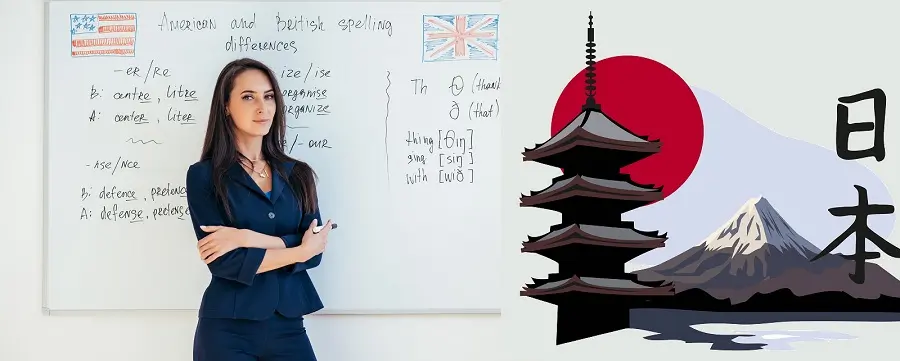Finding English Teaching Jobs in Japan

A quick search online for “English teaching jobs in Japan for foreigners” will unleash a tidal wave of confusing words and nonsensical terms.
ALT? … JET? …. Eikaiwa?
So, what does it all mean? And what should I be searching for to get an English teaching job in Japan?
As Japan aims to internationalize, the need to introduce a more global education to students has increased. And this need has been an increasing need for English teachers in Japan.
Japan offers plenty of job opportunities for English teachers. Moreover, an English teaching job in Japan is also one of the easiest ways to land in Japan without any knowledge of the Japanese language. Many foreigners use this opportunity as the door opener for coming to Japan and later switching their careers to other career paths.
While there are Japanese English teachers in Japan, there is a large concern about students learning more natural English and giving them a chance to interact with people from different backgrounds.
Many companies typically recruit overseas talent from English-speaking countries to come and teach the local students English. These companies often require individuals to be flexible, highly motivated, and have some teaching experience, though it’s rarely required.
Indeed, English teaching in Japan has a broad spectrum of roles, each with a unique set of advantages and disadvantages. Simply searching “English teaching in Japan” may land you in a role for the expat life you have fantasized about.
Before beginning your journey of moving to Japan to teach English, take the time to read this article to uncover what kind of English teacher you want to be!
Assistant Language Teacher (ALT)
Requirements: Native English, bachelor’s degree
Many people have dreams of working in Japan as an office employee. Work in one of those beautiful high-rise buildings in Tokyo or establish your brand as an entrepreneur. While those goals are certainly possible, the road to success in Japan for many people often starts in the education sector. Mainly being an Assistant Language Teacher (ALT) for 1-3 years.
ALT positions are easy to find, as they are often posted on international job boards. They have a decent starting salary and are usually low commitment compared to other full-time jobs in Japan. Moreover, an ALT or Assistant Language Teacher’s job offers an opportunity to come to Japan without Japanese language skills.
An Assistant Language Teacher (ALT) is generally employed by a dispatch company and sent to elementary, junior high, or high schools across Japan to assist or run English classes.
Many of these dispatch companies hire from abroad and will provide new teachers with accommodation and transport assistance to ensure a smooth and painless transition.
As Assistant Language teachers do not directly work for the school itself, they may be swapped around to meet demand, making the position feel somewhat unstable. Work hours will likely match school hours, and weekends, public holidays, and school holidays will be off.
As the name suggests, ALTs assist the Japanese teacher of English (JTE) and can work from primary school to the university level.
As an ALT, you will have a Japanese teacher’s support and pre-arranged teaching materials.
Becoming an ALT is a comfortable, unchallenging road to a successful English teaching career in Japan. Moreover, prior teaching experience is not necessary to work as an ALT in Japan.
The requirements for hiring are usually just a college degree and a can-do attitude. The position is often associated exclusively with English because English is the primary foreign language in Japanese schools. However, some ALTs work in other foreign languages besides English.
The History of ALTs
The history of ALT goes back to the 1980s as an initiative to help Japan internationalize. The teaching position gaikokugo shido joshu (外国語指導助手), which translates to “foreign language assistant,” was created in 1987 by the Japanese Ministry of Education along with the JET Program.
In 1999, the Dispatch Law was changed, allowing companies to expand into different business avenues outside of manufacturing. This allowed for education to expand as well, and other dispatch ALT companies began appearing.
How to Find a Job as an Assistant English Teacher in Japan?
One can be hired as an ALT through the JET Program, explained later, through a dispatch company or as a direct hire. Direct hires for ALTs are very rare and often require the applicant to already be in the country with additional certifications outside of a college degree.
The screening process requires several documents, such as a statement of purpose essay, a health report, university transcripts, a copy of your degree, and 2-3 professional references.
If you pass the initial screening, you will be invited to an interview in your home country or Japan if you are already in the country. There will be 2-3 representatives in the room to ask questions about your interest in Japan, work experience, and future plans.
You can prepare for the interview for ALT positions with the help of the sample questions available online. During the interview, the employer may ask you for a demo lesson if you have teaching qualifications or other essential skills.
Working as an ALT


Although the duties of ALTs will be significantly less than those of regular school teachers, ALTs are still considered part of the staff. The hiring company will expect you to perform appropriately like the regular school employees. This includes attending daily morning meetings, adhering to dress codes, and participating in school events.
For Assistant Language Teachers, the workdays are generally from Monday through Friday, 8:30 am to 4:00 pm, with extra hours on the occasional weekend. Classes are 45-50 minutes long, and ALTs have about 17 to 20 classes a week. Some ALTs are primarily at one school, while other teachers will have 3-5 schools to visit monthly.
The primary duties of an ALT are to assist the JTEs in delivering lessons in the classroom. This may include lesson planning, grading, and other language-teaching tasks. Sometimes, the ALT will be asked to facilitate club activities such as English club or offer extra tutoring for students entering speech contests or taking the Eiken tests.
Career Opportunities as an Assistant Language Teacher
The life of an ALT, while carefree, is unfortunately short-lived. Since ALTs aren’t expected to have any qualifications outside of a college degree, there won’t be many chances to advance in assistance language teaching. Typically, your ALT contract will be for up to 5 years. However, many Assistant Language teachers switch companies or career paths after 3 years.
You can also go for a master’s degree in a related field, such as linguistics, education, or Teaching English as a Foreign Language (TEFL), or obtain a “special teaching license” in Japan if you wish to continue your career as a teacher with more growth opportunities. This license is an instructor license for those who have not completed a teacher certification training course in university but have specialized knowledge, skills, or experience related to the subject they oversee as a teacher. You must pass a prefectural school board’s education staff certification selection to get this license.
Dispatch Companies for Assistant Language Teachers
There are many ALT dispatch companies to choose from if you want to become an Assistant Language Teacher in Japan. Some are a bit more rigorous to apply for than others, but overall, they offer the same ALT experience across the board.
The Japan Exchange Teaching (JET) Program
Requirements: Native English, bachelor’s degree, impressive resume.
The Japan Exchange Teaching Program (JET) is the world’s most well-known program for foreigners aiming to work as Assistant Language Teachers in Japan.
While the JET (Japan Exchange Teaching Program) Program works essentially like a dispatch company, its high reputation and supposed mission to present teachers as representatives of their home countries set it apart.
The Japanese government sponsors the JET Program and is not a profit-seeking business, putting less pressure on teachers while creating a comfortable environment.
The program is notorious for its strict and inscrutable selection criteria. The application process is rigorous, with a year-long recruitment process that only 20% of applicants pass annually to serve in Japan.
Successful candidates will be relocated to the countryside or suburbs to perform the same duties as an ALT. However, there are also Coordinator for International Relations (CIRs) positions offering work at local government offices to assist with various duties, including translation and event coordination.
The application for the JET program usually becomes available around late September and closes in early November. Recruits announce their placement in April and come to Japan in July and August. They offer the highest payout for ALT work since the government sponsors them, but there is not much flexibility regarding the desired location for the ALTs.
Companies Supporting the JET Program
Interac
Interac is the largest private provider of ALTs in Japan. They dispatch the employees as teachers to various schools in different geographies in Japan. The recruitment period is in late March/early April to coincide with the new school year and one for late August when students return from vacation. The typical salary is from ¥230,000 to ¥250,000 per month.
Heart Corporation
Heart English School Dispatches ALTs around the Kanto area. The salaries of ALTs tend to be lower than other dispatch companies, but it greatly depends on your contract.
Unlike other dispatch companies, Heart requires ALTs to have a basic understanding of Japanese or at least a strong desire to learn. If you decide to pursue another career, Heart provides job placement assistance for employees with JLPT N1 and N2 Japanese levels.
Borderlink
Borderlink operates in the Kanto, Chubu, and Kansai regions of Japan. The salary starts around ¥200,000 per month but depends on your experience and credentials. Like other companies, Borderlink sponsors visas, assists with housing, and even promises to have staff available 24 hours in an emergency.
Altia Central
Altia offers positions in central and southern Japan. The salary is competitive, starting from ¥240,000 with fully paid summer and winter breaks and bonuses for renewing your contract.
Being an ALT in Japan is a noble position, and while the requirements for the position are typically low, it does take a lot of skill to be successful. It’s a pathway many foreigners have taken in Japan to make a career foundation in Japan. Many foreigners use this opportunity to start as ALT in Japan and later move to other career paths. As Japan seeks to internationalize to be more competitive in the global economy, the position does not seem to disappear anytime soon.
Eikaiwa Teachers
Requirements: Native English, Bachelor’s Degree.
Alongside ALTs, Eikaiwa teaching positions are also very popular among foreigners in Japan. The word Eikaiwa (英会話) means “English conversation” in Japanese, which essentially sums up the business model.
Students of varying ages, including adults and children, attend the school to chat with a native English-speaking teacher. As these schools need to accommodate workers and students, Eikaiwa teachers will likely be working weekend and evening shifts. The drawback is that enjoying a social life is somewhat difficult.
Unlike ALT positions, Eikaiwa schools are strategically near popular transport hubs in bigger cities. This allows teachers to live and work in some of the trendier hotspots across Japan.
As an Eikaiwa teacher, you will have to deal with a huge demographic of people. This could mean jumping from a class of kids to having deep conversations with a fluent professional in the space of an hour.
Like ALT positions, the Eikaiwa experience will depend entirely upon the quality of the school. Hence, it is better to do some thorough research and try to chat with a current or former employee before applying.
Being a for-profit business, the employer may also encourage the teachers to sell textbooks and additional lessons to students. However, this sales part of responsibilities may be uncomfortable for some. Most Eikaiwa schools will hire English teachers from abroad. Like the Assistant Language Teachers, prior English teaching experience is unnecessary for Eikaiwa English teachers also. Eikaiwa classes are often small, with one-on-one lessons extremely common.
Like an ALT, being an Eikaiwa teacher can also be a stepping stone to starting a career in Japan. They offer a stable salary, visa sponsorship, and even career growth opportunities within the company.
Becoming an Eikaiwa Teacher
As mentioned above, similar to ALT, you don’t need the experience to become an Eikaiwa teacher.
Becoming an Eikaiwa teacher is easier than becoming an ALT, which is beneficial for the applicants and hiring companies. The application process is much shorter, and companies often hire applicants within three months.
Foreign applicants can apply from overseas or from within Japan. Overseas applicants must apply to the country’s corresponding recruitment offices, usually in major cities. Local applicants in Japan apply to the Japanese recruitment websites and select the area they wish to work in.
Eikaiwa recruitment agencies often look for upbeat personalities rather than seasoned teachers. Since English conversation schools depend highly on customer satisfaction, teachers act more like salespeople for the school than actual teachers.
Working as an Eikaiwa Teacher
As mentioned above, Eikaiwa schools focus on students’ English conversational and grammar skills.
The field of Eikaiwa teaching is much more diverse and flexible than a typical ALT. Although the schools primarily focus on English conversation, native speakers of other languages also have an opportunity to provide lessons in their native language.
English conversation schools supplement English education in school or target adults interested in learning English. The workday typically starts around 12:00 noon and ends close to 9:30 pm. Teachers can work as little as four hours daily but no more than eight with 5-6 classes daily.
Eikaiwa classes are small, with 4-6 students per lesson, with some options for students to take private lessons. The lessons go for 40 minutes, and teachers get a five to ten-minute break to prepare for lessons.
English conversation schools are usually open from Tuesday through Saturday to accommodate students and workers. Saturday, being a working day, leaves teachers with a nontraditional weekend. Although similar, the salary of an Eikaiwa teacher can be higher than that of an ALT.
Salaries of Eikaiwa Teacher
Eikaiwa teachers generally earn based on the number of students and the number of lessons. The compensation generally does not depend on the number of hours they worked. Therefore, popular teachers have the potential to earn more than ¥300,000 monthly. Since many Eikaiwa schools are part of a chain, teachers must travel to multiple schools during the week.
Type of Staff in Eikaiwa English Schools
There is a mix of Japanese and English-speaking staff. The native Japanese staff typically work at the front counter to check in with the students and handle any issues the students might have. The native Japanese staff doesn’t need to know English, but many can communicate at a basic level in English.
As Eikaiwa teachers do not need a background in teaching, you will have a readymade school curriculum without much need for prepping for your lessons. Aside from teaching English lessons, Eikaiwa teachers also act as sales representatives with possible requests to conduct trial lessons for prospective students throughout the day. You may also have to sell a new product to students at the beginning and end of the lesson.
Formal Attire is a Must
Most students coming to Eikaiwa schools are working professionals, so teachers must maintain the same Japanese professional standards. The dress code and code of conduct are very strict for many of the Eikaiwa schools. Teachers must dress professionally in slacks, button-downs, and appropriate shoes and keep a professional demeanor in front of the students.
Career Opportunities for Eikawa Teachers
Since English conversation schools are businesses for profit, many career advancement opportunities exist for teachers who wish to pursue a different career. Companies easily promote teachers with a good track record in managerial roles. Working as a manager will involve you in handling the school’s scheduling and training of teachers.
There are also opportunities available in HR and recruitment for new teachers from Japan and overseas. Teachers can also advance to the business world of English teaching and work exclusively with working professionals to improve their communication skills.
Downsides of working for an Eikaiwa
Working as an Eikaiwa teacher is a very good job for many newcomers to Japan. Still, like with any job, some downsides may depend on your personality and preferences. Working at an Eikaiwa is not always ideal for those passionate about teaching because the school focuses on business first.
These schools depend on student tuition fees. Foreign teachers play a significant role in maintaining profit levels as they are the face of the operation. As mentioned above, Eikaiwa teachers are expected to act as salespeople first and teachers second. While many students are serious about their studies, some students are only interested in the experience of speaking with foreign teachers, and you will be required to sell them on that experience.
As many English conversation schools operate as a chain, and teachers are expected to work at multiple schools, working at multiple schools makes building a rapport with students challenging. Moreover, schools can sometimes be up to an hour away from home.
Many schools also constantly come under scrutiny for their bad work practices. The general union has sued some for withheld wages and other unfair working conditions. Researching the Eikaiwa you are applying to before accepting the offer is recommended.
The flexible nature of the job also does not provide the best environment to socialize after work hours. Teachers typically work late into the evening, and although the Sunday-Monday weekend is typical, your work weekend can differ depending on the school.
Eikaiwa Recruitment Schools
There are hundreds of Eikaiwa schools around Japan to choose from if you want to become an Eikaiwa teacher. Below are the biggest companies in Japan for Eikaiwa teachers. Following are some of the prominent Eikaiwa schools:
NOVA
NOVA has two types of contracts: the standard employment contract and the independent contract. The independent contract allows teachers with other entrepreneurial pursuits to continue teaching while working freelance elsewhere.
The typical salary of teachers is around JPY 230,000 monthly, depending on how many students and lessons teachers have. Nova focuses mainly on casual English conversation for adults but offers children and business professionals lessons.
AEON
Aeon offers a lot of assistance for new teachers to settle in Japan. This support includes setting up your bank account, registering at your local office ward, and providing subsided fully furnished apartments. Regardless of the number of lessons you teach, this salary is ¥270,000 per month. However, 15 hours of the workweek goes into interviewing prospective students, counseling, and completing progress reports.
GABA
Gaba, employs English teachers as outsourced contract workers under gyomu itaku (業務委託) contracts. This means you decide how many one-on-one 40-minute classes you’d like to teach. Although you can decide your work hours, you are responsible for paying your pension, health insurance, and travel expenses. While Gaba mainly focuses on business professionals as clients, they also offer classes for children.
Berlitz
Berliz schools are in urban areas of Japan, mostly in Tokyo and Kanagawa. 80% of the students of Berlitz are business professionals and adults. Full-term teachers teach 27 hours a week and receive a monthly stipend of ¥250,000.
Apart from teaching, other responsibilities include preparing lessons, writing reports, and other administrative tasks.
Pros of Working as an Eikaiwa English Teacher
Being an eikaiwa teacher offers much flexibility while working in Japan. For many people, it’s a means to the end objective of working in Japan. However, many people have made lucrative careers in their companies through promotions to managerial levels or by moving to different career paths. As the need for stronger English education, new schools and positions will likely open around Japan in the coming years.
Private English Teaching
Requirements: Decent English level.


While starting your private tutoring business is only possible on certain visas, casual, cash-in-hand, cafe, or home-based private lessons are generally OK for anyone. You can try advertising yourself online, through friends, co-workers, or word-of-mouth. Being a foreigner in Japan, it is almost inevitable you will be asked for a private English lesson at some point. So, why not use the opportunity to earn some extra cash?
Teaching English at International Schools
Requirements: Native English, bachelor’s degree, teaching experience, impressive resume, and relevant qualifications.
International schools in Japan often hire foreign teachers domestically to provide students with an authentic international experience. These jobs are scarcely available for new expats, making them more of an aspiration for long-term English teachers with impressive resumes.
For a greater chance of success, applicants are better off acquiring an official English teaching certificate, such as CELTA or TESOL. Naturally, those with a teaching degree will further enjoy increased job prospects.
Many of these jobs are based at kindergartens, which are surprisingly easy to find for expats in the know. However, the most acclaimed international schools require ample experience, relevant qualifications, and extraordinary references. This makes such jobs easier to get for someone who is already a teacher in their home country.
English Teaching Jobs at Japanese Universities
Requirements: Native English, bachelor’s degree.
Offering easy work in prime locations, English-teaching gigs at universities in Japan is one of the best jobs for English teachers in Japan.
Generally, you will likely be employed through a dispatch company. The dispatch companies offer university teaching jobs to the company’s best and most experienced teachers. However, with good networking, you can always get direct employment from a university.
Online Tutoring
Requirements: Native English.
Owing to the impact of COVID-19, the demand for online English tutoring worldwide has become insatiable. Best of all, this job is available in Japan and your home country, with the only requirements being a computer, microphone, and stable internet.
You can either sign up for a private tutoring service, post an ad on a job board, or become employed by an online tutoring company. This is also an excellent option for those seeking extra pocket money or to gain experience before applying to teach in Japan.
Limitless Opportunities!
The world of English teaching in Japan is rich with variety, diversity, and opportunity. Each position has pros and cons to weigh alongside your goals and desired lifestyle. Whether it be an ALT, Eikaiwa, teaching English at university, online teaching, or private tutoring position, there are plenty of opportunities for an English teaching job in Japan.
The need for English education is growing rapidly in Japan. Japanese students must take English as a part of their curriculum from the fifth grade through their last year of high school. However, the Japanese education system does not encourage English fluency but focuses on grammar and vocabulary.
Students can usually pass their exams but have very little experience in holding English conversations. Private businesses have responded to the education gap with English conversation schools or Eikaiwa (英会話), which allow students to learn English from native English speakers.
You can find Eikaiwa schools all over Japan, from small rural villages to large cities. They can be privately owned by individual families or run by large corporations. Although the work of an ALT and Eikaiwa Teacher intersect, the main functions and goals of the students are different.
Living in Japan as An English Teacher
Many dispatch companies and the JET Program often help provide accommodations for new hires. Depending on the area of Japan you are placed in, your housing might not be subsidized. In such a case, you must pay rent out of your earnings. Companies do provide relocation assistance to recruits. The assistance could be a plane ticket to Japan or cover a certain percentage of move-in fees.
The JET Program enrolls all teachers under Employee Health and Social Insurance. However, other dispatch companies might not cover either of these and will require recruits to enroll in the National Employee Health and Social Insurance independently.
Salaries are paid monthly, ranging from ¥200,000 to ¥275,000 for monthly payments. Vacation time can vary from 5 days a year to up to 20 days a year. The JET Program is famous for the high payout of ¥275,000 monthly salary and 20 days of paid vacation for ALTs.
Conclusion
Even though the earning potential for English teachers as salaried employees is less than many other professions, a job as an English teacher in Japan is a door opener for entry for foreigners into Japan.
An English teaching job is one of the few jobs that do not require Japanese language skills. Once you are in Japan with a sponsored work visa, it is easier to change your career path to get opportunities with higher earning potential.
Moreover, spending some time as an English teacher in Japan and interacting with Japanese natives also offers an opportunity for foreigners to learn Japanese and Japanese culture and traditions. A better understanding of the language and customs further increases the prospects for better career opportunities in your desired career direction.


Born in Melbourne, Australia, Steven came to Japan as an English teacher and currently works as a writer in Niigata City. Bilingual with fluent Japanese language, Steven loves relishing local sake, reading anime, and traveling.

